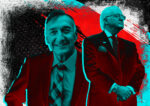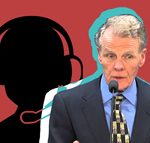Michael Madigan’s ongoing federal corruption trial has unveiled a web of political maneuvering that directly connects Chicago’s real estate scene to insider politics.
Prosecutors allege that Madigan, Illinois’ longest-serving House Speaker until his resignation in 2022, used his dual roles in politics and private law to build a network of influence resembling a criminal enterprise, the Chicago Tribune reported. Alongside him, longtime associate Michael McClain faces similar racketeering charges. Both men have pleaded not guilty.
Shocking testimony and evidence has been delivered by Daniel Solis, a former Chicago alderman turned FBI informant who was also the city’s Zoning Committee chairman and has admitted to accepting bribes in order to move real estate projects forward. He secretly recorded meetings and calls with Madigan while cooperating with federal investigators.
These recordings, along with Solis’ testimony, depict Madigan’s alleged strategy of leveraging his political clout to benefit his law firm, Madigan & Getzendanner, which specialized in reducing property taxes — a critical factor for developers navigating multimillion-dollar projects in Chicago.
In one 2018 recording, Solis promised to introduce Madigan to prominent developers, including Harry Skydell, behind the $600 million Old Post Office renovation, in exchange for Madigan’s support for Solis’ post-retirement aspirations. Another tape captured Madigan urging Solis to help his son, Andrew, secure business opportunities.
The trial has also exposed Madigan’s careful approach to influence. While less blunt than Edward Burke — a powerful Chicago politician convicted of corruption in a separate case — Madigan is portrayed as tactful, often deferring technical details to his law partner but leaving little doubt about the value of his public sector connections.
A 2017 meeting about a West Loop condo project — the 357-unit Union West project built by ZOM Living — was recorded by Solis, and highlighted this dynamic. Madigan, 82, introduced his firm as adept at influencing tax outcomes, prompting a developer to note the importance of “reputation.” Madigan reportedly assured, “We’re interested in a long-term relationship.”
However, defense attorneys argue that Madigan’s actions fall within legal bounds, framing his responses as benign conversational habits rather than evidence of corruption. They contend that Solis exaggerated claims to curry favor with the FBI.
The recordings also reveal moments of levity and insight into Madigan’s personality, from his aversion to Chicago’s North Side to his fervor for Notre Dame football. Yet the trial’s broader narrative centers on blurred lines between public duty and private gain, raising questions about ethics in Chicago’s entrenched political culture. Madigan’s alleged misdeeds also involve using his influence to win lucrative contracts for associates in other economic sectors, such as through electric utility ComEd.
As testimony continues, the jury faces the challenge of distinguishing between political networking and criminal conduct, with prosecutors arguing that Madigan’s dealings exemplify systemic corruption, while defense attorneys portray him as a dedicated public servant caught in political misunderstandings.
— Andrew Terrell
Read more



